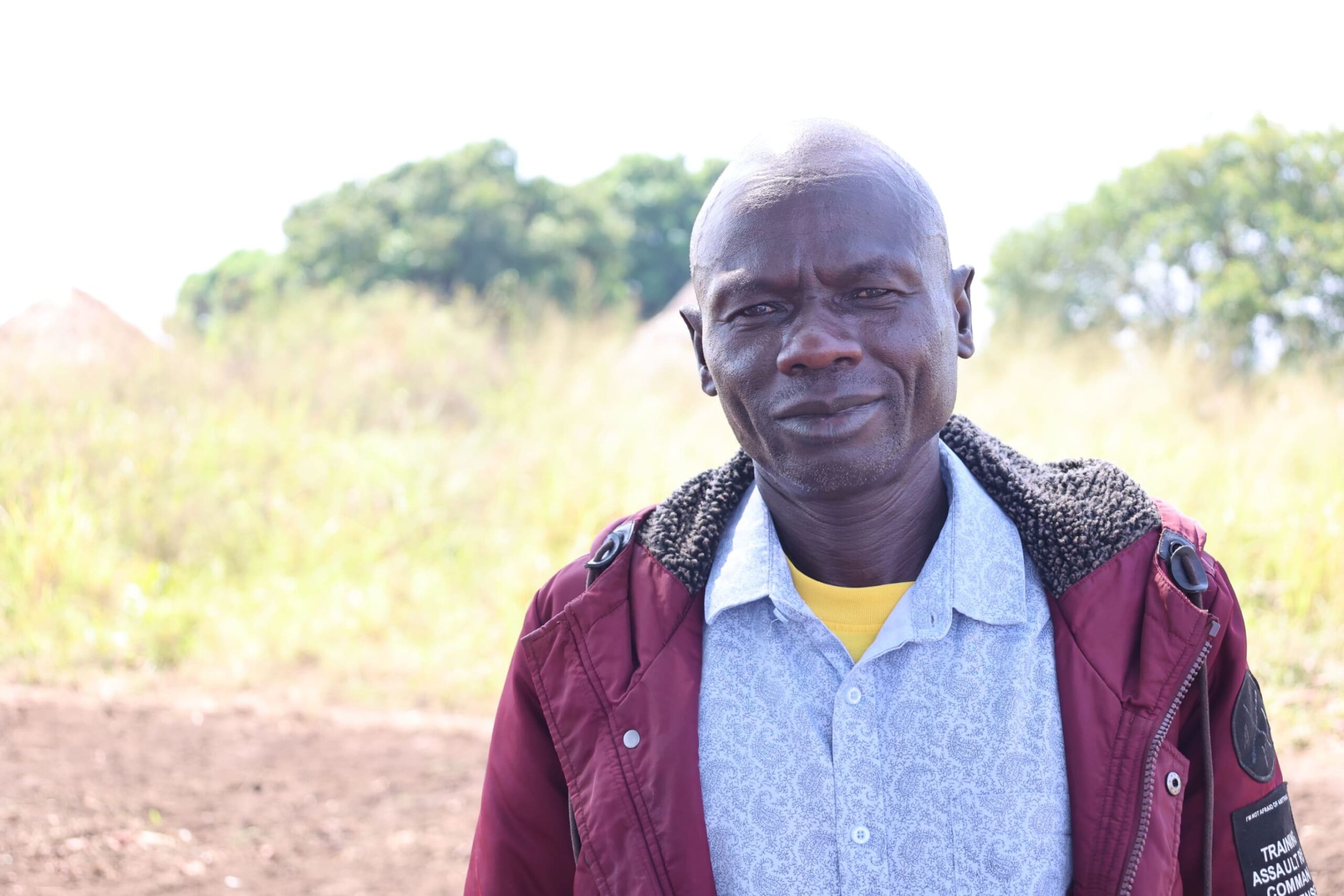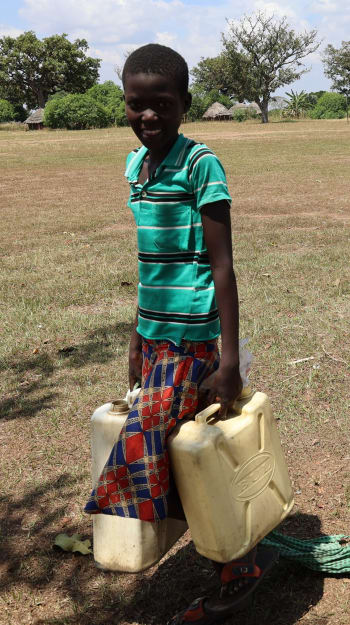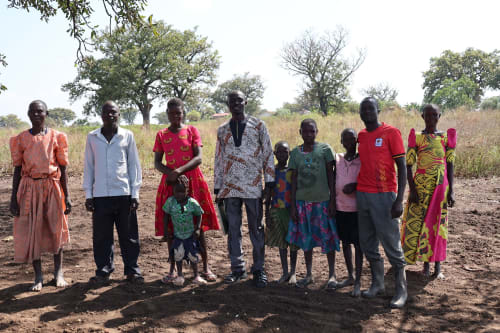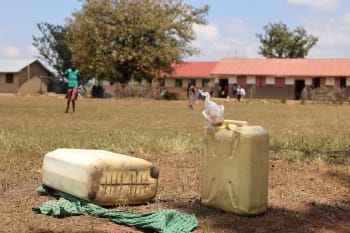Article
20th November 2024
7 minute read

Uganda is a country that has suffered severe instability over the last fifty years and whilst the country now is largely peaceful, the effects of civil war still haunt remote communities and hold them back from development.
Just a Drop supports these rural communities, schools and health centres with access to clean safe water, improved sanitation and hygiene training in the districts of Wakiso, Kisoro and Kapelebyong.
This year, the theme for World Water Day is ‘Water for Peace’ which focuses on the critical role water plays in the stability and prosperity of the world.
We spoke to Robert, a community member from Angicha Village in Kapelebyong, north-east Uganda, who told us about the impact that civil war had had on his community, and how water is helping them to rebuild their village and their lives.
He told us:
Other places have lived in peace but we have always been in the shadow of war. The Lord’s Resistance Army would operate close to here so this area was an IDP [Internally Displaced People] camp. This community, they were really affected by war and that’s why you see that the economic status and conditions of the community are still really bad even today.
This school, it is the creation of the war, no government has bothered to help us to build any structure, like classrooms or teachers houses. The school was a shelter in the IDP camp in even 2003. You can see the iron sheets in the roof and find some bullet holes there – it is an inconvenience in the learning process even today. Sometimes the rain drops through the holes onto the child’s desk when they are learning.
The latrines at our school are condemned and people are sharing with the teachers, the teachers are worried about going to the latrines in case they see some pupils here when they have to relieve themselves. The toilets are filled up so we cannot use them. We tried and we tried to ask the government to help us but with no luck, you see nothing has been done.
You see this water here, this is helping the school so much – we are really happy, really happy to have this water and for all that has been done for us. You see when this was put in, it meant that the children didn’t need to go to the swamp to get their drinking water. But now water has come, you heard our cries.

Now we will look to focus on improving the school, maybe we can build houses for the teachers. The teachers here are leaving every year because they don’t have any houses, every year we wish they stayed and had houses, every year. It causes us many problems.
Because of war, many people suffer here. HIV and AIDS are a factor, and I myself have succumbed to this. It’s because there were soldiers nearby, a big barracks, and that’s why the economic status is so low.
People cannot afford even two meals a day, they cannot afford for children to go to school and the challenge is because of this to stop girls in the community becoming pregnant.
Some girls that you see around, from 18 to even 12 years old are pregnant. Because they do the household chores anyway, their fathers don’t see the need for school. They think that instead of going to school, they would prefer to get a dowry and maybe to try and help themselves to have some money.
So education levels are low, which keeps the economic status low and means the community keeps growing. It is a challenge. Without so many chores, such as collecting water, we would hope for this to change.
Now, back to the water sources here…
We are lucky here to have water because in Kapelebyong there are many villages who cannot have clean water. I myself have seen these villages.
Lots of the boreholes in this area were built in the 90s and so some of them are non-functional now. They were built as emergency water sources for the camps but they were never serviced or looked after.
They are there but the community cannot use them, and don’t know how to repair them. They are wanting to use them, the whole population wants to use them but instead they must collect dirty water instead. In these areas there are many swamps so people collect water from here.
And this causes problems because the nearest health centre is not close to here. It is even 20km away, so when people become sick from dirty water, it means they have to travel very far which is very expensive. But this is what people must do.
Even when people can save up and have a market stall, when a family member becomes sick, these savings are all gone and they must start everything again.
We hope that by drinking water from the borehole it will mean this does not happen.”

Simon (four across left, alongside his family, in the photo above) is another member of Robert’s community, and part of the village’s water-user committee. He explained to us the further reaching consequences that access to water through his borehole had had on the community:
I’m too too happy for the project here.
When we were having to walk to a borehole, we could take an hour there to fill the jerry can because the queue was so long but now we can collect water from this borehole.
My wife and children are at home now, and no longer outside all day.
We will use this water not just as drinking water but it is an opportunity to start my projects.
I am using the water, now it is plentiful, to grow onions, carrots, green pepper, tomatoes and potatoes. I am building a garden around this water.

Communities in areas such as Kapelebyong in Uganda were victims of a civil war that spanned decades. Thousands of children were taken as child soldiers and forced to commit horrific crimes; largely against women, children and civilians. By the end of the war, northern Uganda was faced with a population who were deeply traumatised and lost everything.
Infrastructure had been destroyed and communities didn’t have the resource to reconstruct their villages, so commodities such as food and water were hard to come by. Rebuilding their lives has taken time, and even today, it is clear to see how much impact the war has had on communities.
In Kapelebyong, poverty is endemic and it’s exacerbated by ill health caused by dirty water and poor sanitation. Government figures show that 77% of the Kapelebyong population live below the poverty line, against the national average of 21.4%.
Robert and Simon’s community of Angicha, is just one village that Just a Drop is working with in the area. We are providing safe water, sanitation, and hygiene education to over 20,000 people in Kapelebyong to overcome some of the challenges that communities such as Angicha are still facing because of the recent instability in the region.
One of the ways Just a Drop looks to help communities to escape the poverty trap is through improving livelihoods through practical and sustainable solutions related to water, hygiene and sanitation. Recently, Just a Drop has set up a successful microloan programme. This is particularly impactful for women, as when women no longer have to walk to collect water, they have more time – the loans help them to build businesses, contribute to their family finances and move out of poverty.
In addition to this, we teach children about menstrual hygiene including how to sew reusable sanitary pads made from locally sourced materials which helps girls stay in school by breaking down harmful taboos about menstruation and improving knowledge.
Safe water changes everything. It unlocks potential, – improves health, education and women’s rights, community development, economic growth and brighter futures.
Please help us to reach more communities like Angicha and enable Just a Drop transform lives by donating below to Just a Drop.
Make a difference
Can you help to support people around the world with safe water, sanitation, and hygiene? Give once or on a monthly basis to be a change-maker.